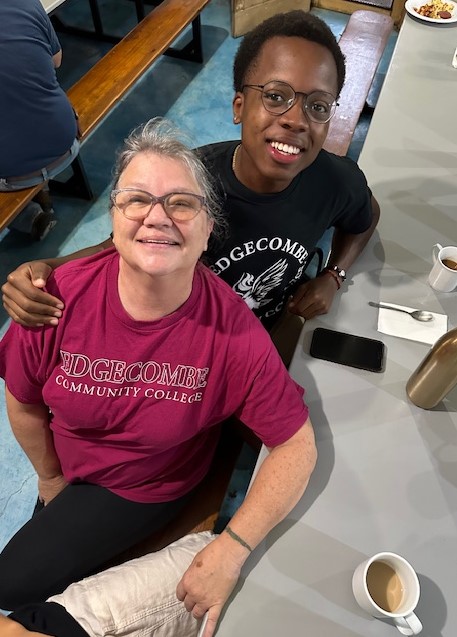ECC Student and Instructor Make a Difference in the Dominican Republic

Christopher Lacy is pictured with his instructor, Suzi Shippen-Wagner
Edgecombe Community College student, Christopher Lacy, beams when he talks about his recent trip to the Dominican Republic. The surgical technology major traveled to the country in November, working in the operating room with a team of nurses and doctors who performed nine surgeries.
“I was able to first scrub. I also set up the sterile field and gloved the doctors,” says Lacy. “It was extremely great to work in the operating room with a team I never worked with before. I feel very accomplished.”
Lacy’s experience, however, extended beyond the operating room. When asked about his first visit to the Dominican Republic, he evokes memories of majestic mountain views, a ride to the hospital on the back of a pickup truck with the operating team, and the locals who waved to the team as they traveled to the hospital. Lacy also had the opportunity to glean valuable information from medical experts, including a doctor he roomed with during the trip.
This educational and cultural exposure for Lacy, one month before graduation, was possible primarily because of the efforts of ECC’s program chair for surgical technology, Suzi Shippen-Wagner. A 10-year employee of ECC, Shippen-Wagner has traveled to four developing nations on three continents with US-based medical teams.
“The first time I went on a medical mission, I went to Romania and kind of got the mission bug,” recalls Shippen-Wagner. “It was just so gratifying to be able to take care of folks and know they would not be able to get this kind of care anywhere else at any other time.”
The care didn’t stop for Wagner after her Romania trip. Since that time, the Kansas native has been involved with medical mission trips for nearly 15 years, with stops in the Honduras, Guatemala and the village of San Juan de la Maguana. Typically, students accompany Shippen-Wagner on her trips, applying what they’ve learned in the classroom to the operating rooms for gynecological surgery. Since 2019, six students have traveled with the program chair. Lacy was the first male.
“I think for my students, confidence is competence,” says Shippen-Wagner. “If you can scrub a case in a Third World country where resources are so very limited, you can do anything in the US where we have the best of the best and unlimited resources.”
According to Shippen-Wagner, surgical technology students get rigorous training before accompanying her on medical mission trips. They must complete 500 hours in the operating room and 120 cases. A case is per patient, per specialty. For example, if a patient’s tonsils are removed, that is one case and one specialty. It takes approximately eight months for students to fulfill those requirements.
“From August to December, we learn our instruments, how to gown and glove each other, and how to prep our patient,” acknowledges Shippen-Wagner. Students go to the hospital in January where they work on real patients. There is no simulation.
Shippen-Wagner’s training is why Lacy says he could travel to the Dominican Republic for the first time and perform with a team of doctors from Boston and Raleigh, as well as nurses from California, Florida and Georgia, without hesitation.
“She is a great teacher,” says Lacy. “I would bring up the things that she taught me, and there were things I could apply in the operating room from the things she showed me.”
Lacy, who is no stranger to success, was also one of 10 to be accepted to the Mayo Clinic for an internship in the summer of 2024. Lacy’s pinning will be Dec. 13. He plans to obtain his undergraduate degree in applied science. His goal is also to use the knowledge he has gained from ECC to go into the cath lab after graduation and perform minimally invasive procedures.
“We take care of one patient at a time, but we don’t know what that means to the greater circles,” says Shippen-Wagner. “That’s a mother, a wife, a daughter. Surgery affects that family, village, church, employers. We take care of one patient, but we also take care of an untold amount of people.”
